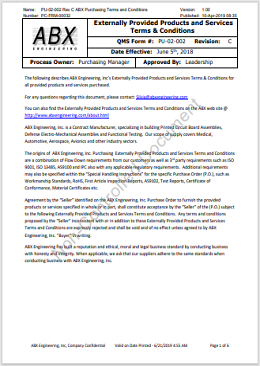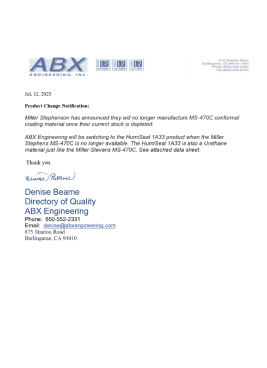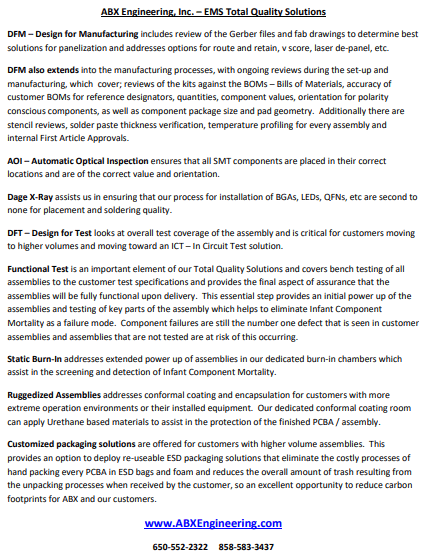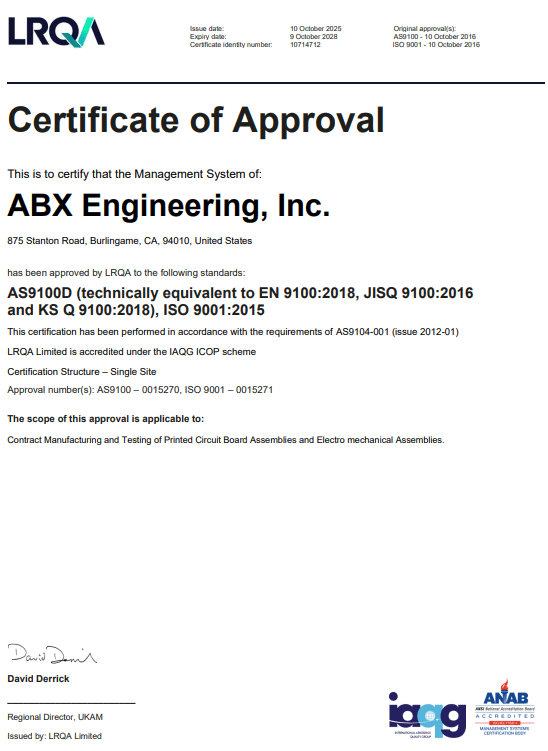Certifications
Frequently Asked Questions
What to look for in a Contract Manufacturer?
Quality
Does your current manufacturing program meet your expectations for quality? Quality should be viewed as a profit center. The less you have to work with defective product off of the manufacturing line, or deal with RMA’s related to quality workmanship the more you profit.
At ABX our reputation for quality production is among the very best of all EMS providers, with 99.7% shipments to returns ratio for 2018, we strive for zero defects in the product we provide to our customers.
On Time Delivery
Does your current manufacturing program consistently meet or exceed your expectations for scheduled production deliveries?
At ABX we understand the importance of your production schedules and commitments you have to keep to your customers. We have a strong reputation for providing our customers with accurate production schedules, we work very hard every day to meet or exceed. We do this with the experience of years of materials management. A professional team from your sales program manager, to our materials planning, purchasing and production management staff, and a very hands-on executive team of our President and Senior Executives.
Support
Does your current manufacturing program go that extra mile to support your overall product/production needs?
At ABX we understand that designs are sometimes late, that problems will be found in manufacturing that were not anticipated. In the real world we all deal with component lead time issues, obsolesce, etc. Time and time again, ABX does what has to be done to get you your product. To go that extra mile to find the hard to get parts, to offer to work weekends, to offer our engineering and manufacturing folks to collaborate with our customers to find a way to get it done, rather than simply say no and move on to some other job. We know you have trusted us with your production program and we know what we have to do to get the job done.
Cost/Value
Does your current manufacturing program provide you the best value in how you spend your manufacturing budget? Are overhead costs, quality problems and other production related costs resulting in a less than desired product cost?
If you’re not building product at ABX, you may not be getting the best value in your production program. We will work very hard to provide you with a product cost that will save you money, not only in the obvious cost you pay for the product, but in the true overall manufacturing program costs for the production of your product.
References
Would your current contract manufacturer use you as a reference? Do they perhaps from time to time take your business for granted?
ABX has been serving our customers since 1980 – our references are our best-selling tool. We understand the importance of 100% customer satisfaction and everyone on the ABX team marches to that beat! Many of our customers have been with us for more than 5 years, some more than 15 years. Yes, we lose customers, but it’s generally because they outgrow us, move on to an off-shore tier 1 CM’s, or decide to bring their production in house, where even in this scenario we work hard to help them succeed in their transfer and are still here to support them when it’s to their advantage.
Why outsource manufacturing to a domestic manufacturer as opposed to China for example?
Outsourcing in America provides an option to offshore manufacturing that in many cases has significant advantages. Communications are better as the companies are not on radically different time zones and speak the same language. In most cases start-up times are less, as travel time, transfer logistics and communications are easier. Every production scenario has its “sweet spot” of what volume of production benefits from what options of domestic or offshore production. Some of the advantages to domestic outsourcing include:
- Better communications with the factory (sales, engineering, materials, production and quality).
- Faster time to market
- Advantages in quality, faster ramp to quality production
- Highly skilled American workforce
- Lower startup costs and in many cases and volumes lower ongoing production costs
- Significantly lower transportation and logistics costs
- No need to work through 3rd party brokers, foreign offices, or have to invest in overseas staff to manage the factory and assure quality
- Potential savings in duties and tariffs not required in a domestic manufacturing scenario
- Stability in product supply as production is less likely effected by global instability or possible future Import Tariffs
- Protection of Intellectual Property. 100% assurance product designs, circuitry will not be copied or products, or altered copied versions of the products, be sold to un authorized customers or other markets
- ABX’s commitment to green manufacturing
How long does it take to transfer my product to ABX, what are typical production lead times?
This of course varies by product, complexity, lead time, etc. Many of our clients get ABX involved in the initial R&D stages of product development, so the product flows into production at essentially the same time the designs are released for production. A transfer of a current product to ABX can vary in startup times, from as little as four weeks, to three months or more, again depending a lot on component purchasing lead times. ABX has been serving our customers since 1980 and we pride ourselves on our ability to work with our customers to provide an accurate project plan, for production start-up that we can archive. Experience allows us to work with you to plan for as much as possible, and work out problems as they surface in getting your product into production. Our mature engineering and manufacturing procedures, help guide us through this process for new as well as existing customers.
What options exist for custom plastic parts and enclosures, can ABX support the design and manufacturing of custom molded parts used in our design?
ABX can provide complete tooling design and tool fabrication from your product drawings or prototypes. We can manufacture your tooling in Aluminum, P20 or fully hardened H13. Finishing processes available include, texturing, chrome plating of plastic, painting and custom coated RF shielding.
ABX can offer a full CAD design service, using the latest 3D software, to provide ongoing support from concept to production stage.
We provide a single point of contact for all tooling and molding needs. This frees up your time as you deal with one supplier for your tooling and electronic assembly needs.
Based on your annual estimated production quantities, product life cycle and product material, we will recommend the type of tool steel and cavities and provide you with a tooling quote and estimated part price based on the tooling strategy (size, material, number of cavities, etc.) to support your production requirements.
Who is my point of contact at ABX?
There are multiple points of contact at ABX. Typically, each customer has a sales executive who is responsible for the relationship and customers satisfaction. Customers work directly with product managers, purchasing, production management and quality people in the factory as needed. Customers soon learn that our management team, from the President down are very hands on in how we work with our customers, understand, manage and take ownership in their projects. We have the advantage over an offshore manufacture of similar time zones, our staff speaks English and our procedures are documented very well so communications is one of the strong points of an ABX manufacturing strategy. New customers contact our sales team and we will schedule a meeting or phone call to introduce our operation to you.
What are the advantages to outsourcing manufacturing?
For many company’s the answer to this question begins with a simple question. Are you a product company or a manufacturing company? A product company has a product that is special, unique something that their customers need or want to buy. A product with design or feature attributes that often set it apart from other similar products. In most cases a significant portion of the company’s budget went into the design of the product. When the product is ready for production a new set of dynamics enter the picture. How do you replicate the product in volume cost effectively with good quality? An operation dedicated to manufacturing like ABX is focused on manufacturing. Where it may have taken your R&D team several years to design the product, perhaps based on their decades of experience in engineering, likewise our manufacturing team has this same experience in volume production, value engineering and quality assurance. Thus, a company can optimize their success by focusing their dollars on product R&D by saving significant money in manufacturing investment costs. Tooling up for production, buying automated production, testing equipment can easily be as expensive as the product development. Advantages to outsourcing at ABX include:
- No investment required in manufacturing related capital equipment
- An immediate benefit from ABX’s 32+ years of manufacturing experience
- Synergistic purchasing clout, taking advantage of ABX’s buying power
- Faster time to market with less unpredicted problems in launch
- Benefits from a mature quality assurance program and total quality culture
- ISO 9001, ISO13485 and AS9100 certifications for the manufacturing process
- Real savings in the actual cost to produce and support the product
What are the benefits of Contract Turn-Key Manufacturing?
When comparing manufacturing options, it is important to realize the actual costs of the available options. Companies that utilize contract manufacturers for the assembly of their products, where they provide the parts (consignment to the CM), but do not utilize the CM in the materials management function may not be realizing the additional savings available in a Contract Turn-Key Manufacturing (CTKM) scenario.
For the customer, there are many additional overhead costs required to support in-house or consignment production scenarios. In a consignment scenario, there can be significant additional expenses in added overhead of purchasing, warehousing of materials, handling, component obsolescence and general overhead of the management of the production function. For example,
- Unrealized purchasing overhead, a consignment or in-house production scenario requires someone to place all the component orders, track their receipt, administratively handle the paperwork for payment, receive the components, perform incoming inspection, testing if needed on the components, deal with RA issues, expedite missing parts, etc., often the material purchasing, prep (kiting) and handling can represent as much as 50% of the actual production time/cost.
- Pre-production/production costs, pre-production requires someone kit the order, again check that all the components are correct, set-up shipment of the components to the CM, track the progress, follow-up on problems, shortages, etc.
- Cash-flow, cash flow can be less advantageous in an in-house or consignment program compared to a CTKM scenario, unless your purchasing is 100% JIT, and you get significant extended terms from every vendor you purchase from, you tie your cash for the consignment purchasing scenario for additional period of time.
- Inventory, in a CTKM scenario, you do not have to inventory components that exceed the actual requirement of the production build. The CTKM can buy components in bulk where cost wise it is advantageous. You are not taking reels of components to your consignment factory, and then having the burden and extra cost of stocking these components. In the end you are not stuck with every extra part you may have had to purchase to cover production yield issues, minimum quantities, etc. A CTKM scenario saves money, in that you only pay for what you purchase and not for idol inventory.
- Quality, the components used for production can have a significant influence on product quality and your company’s actual cost of supporting the product. ABX has multi-million dollar purchasing volumes with several vendors and an ISO-9001, ISO-13485 and AS9100 driven quality program that has over 32 years of maturity. ABX buys from the best sources, and has the clout to make sure they supply us with the best components. Every production build benefits from an integrated incoming QC program to assure their compliance. The result, you save money with fewer quality problems, and arguably a more reliable product for your customers.
- Predictable schedules and less material related problems, working with a qualified CM in a CTKM scenario provides the added benefit of a proactive awareness of pending component obsolescence, a total quality system (TQS) and a dedicated production management team. The materials, planning, purchasing, quality programs, are perhaps the most important part of the actual production process. Having an order “stuck” on the production floor, because of a missing or problem component(s) can be a disaster to your company, your customers and your cash flow. Having a dedicated materials team, 5 in-house buyers, a highly integrated MRP and tracking computer system, help ABX provide the best on-time delivery and quality to our customers. What is the true cost to your company if you have to back-order a shipment to your customer for several weeks because of a last-minute supply problem that was not anticipated?
When comparing prices of in-house production or a consignment production scenario with a full turn-key CTKM scenario, it is important to consider the total costs of each program. For a consignment scenario additional costs of purchasing, kiting, engineering support, overhead, cash-flow all must be valued. Less obvious are indirect costs related to quality, cash flow and even lost- revenue opportunity attributed to production delays has to be considered.
ABX Engineering has been supporting our customers for over 26 years with CTKM production in addition to consignment production programs.
Does ABX Offer Testing Services?
Yes, ABX offers testing services to complement our turn-key manufacturing programs. For many of our customers, we do complete materials management, production and testing, then we package the product and, in some cases, send it directly to our customers distribution warehouses or distributors.
Our goal at ABX is “zero defects” in the products we ship to our clients. Testing in one more key element in achieving this goal. Even products with no manufacturing defects, can still not work because of a bad component, or part that failed during the assembly process. Testing the finished PCBA or electro mechanical assembly prior to shipment in most cases will allow ABX to correct the problem and pass on a perfect product.
In addition to pass/fail testing, ABX can also load customer firmware in the product, perform calibration and parametric testing and if required run-in the product under power for a defined time as part of the testing quality assurance strategy.
ABX testing services include in-circuit test, flying probe and functional test utilizing the customer provided test programs and fixtures. ABX can provide a quote for testing services based on the customers test procedures, schematics and product documentation. ABX can also quote and provide AOI (automated optical inspection) services if required by the customer. ABX has an in-house test engineering team that is available to work with the client in establishing a test strategy and setting up the test equipment in the factory.
What is the ABX First Article Approval Procedure?
Unless the customer specifies something different the standard ABX production procedures provide a 5-piece first article production, for customer review and approval prior to completing the production run. Unless agreed to by ABX, the customer has 14 days to provide the response on the first article approval, or the sample is considered approved and production will be completed.
What Documentation is needed for ABX to provide a Quote and long does it take?
In addition to the obvious what quantity and delivery is to be quoted on, we typically require, Bills of materials and other applicable engineering drawings.
If available we prefer the bills of materials in Excel format which will help expedite our response. For PCBA’s we ask for the PCB fabrication drawings (Gerber’s). The bill of material and documents should provide an approved vendor list (AVL) for the component manufacturers that are approved for the production.
When you submit your RFQ the time needed to complete the quote varies by the complexity and accuracy of the bill of materials. Typical quotes can be turned around in five to seven working days. If your project is hot you can request the quote utilize the FastTrack process which can be turned in a shorter period of time. Since one of the main objectives of the quote is to better understand and get the best price outcome, allowing a little time for the preparation of the quote can provide the needed time for an advantageous outcome.
Here are a few things you can do to help speed up the quote process
- Formatting, use Excel. One of the simplest things you can do is transmit your BOM and AVL information in Excel format. Excel is the universal language of quoting. When a contract manufacturer receives an RFQ in any other format, the first thing they have to do is translate it into Excel.
- Use “flat file” format. This means one line of Excel for all the information pertaining to that line item. One data point per cell. For example, don’t put multiple manufacturer part numbers into a single cell.
- Content, include complete data. At a minimum, for each line item you will need your internal part number, quantity per, description, approved manufacturer, and manufacturer part numbers in a single cell.
- Provide correct manufacturer part numbers. Often BOM’s we receive have incorrect manufacturer part numbers. To speed up the quote process, update the part number when suppliers tell you the part number is not accurate.
- Fix obsolescence, a large amount of time can be spent investigating obsolete part numbers. BOM’s and AVL’s are usually controlled by engineering, not purchasing, so purchasing rarely has control of this problem. If quote turnaround is a sufficient priority, getting engineering to update BOM’s to address obsolete parts prior to the RFQ is very important
If you are also asking for testing, we ask that you provide a description of the testing required as well as a test procedure or other documents that will help us estimate the time (and additional NRE if needed) required for testing.
Why should I build Prototypes at my Contract Manufacturer that will be doing my Production?
By getting ABX involved at the design prototype stage, we can develop lines of communication about your product and your unique needs. We can provide you with design-for-manufacturing (DFM) and design-for-test (DFT) feedback on you design prototypes, helping to ensure that your final product is cost-effective and efficient to manufacture. When it’s time to move into volume production, we have already worked with the product, saving valuable time in the production ramp up phase.
Does ABX Accept Credit Cards?
Yes, to support new customers for quick-turn or small projects, we can accept credit cards (Visa & Master Card) for payment while our credit department processes the customer’s credit application to establish a credit line for the client. This is often of value where the first engagement is a quick-turn project, where materials, PCB fabs, etc., must be ordered immediately to facilitate an expedited production need.

















